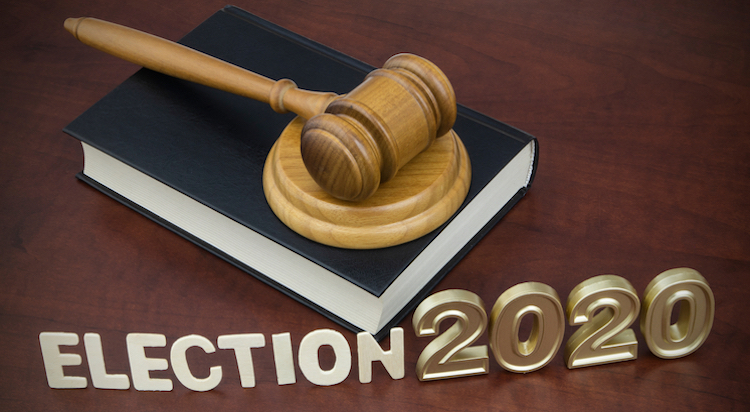Trump campaign appeals after federal judge tosses suit, calls one claim 'Frankenstein’s monster'

Image from Shutterstock.com.
The Trump campaign on Sunday filed a notice of appeal after a federal judge tossed its lawsuit challenging Pennsylvania’s differing approaches to errors on mail-in ballots.
U.S. District Judge Matthew Brann of the Middle District of Pennsylvania refused to block state election results, saying the Trump campaign had provided “strained legal arguments without merit and speculative accusations, unpled in the operative complaint and unsupported by evidence.”
“In the United States of America, this cannot justify the disenfranchisement of a single voter, let alone all the voters of its sixth most populated state. Our people, laws and institutions demand more,” Brann wrote in the Nov. 21 opinion.
Brann found that the plaintiffs had no standing under a recent decision in a different voting case by the 3rd U.S. Circuit Court of Appeals at Philadelphia. Even if there was standing, Brann said, the equal protection claim would fail.
At the time that Brann wrote his opinion, President-elect Joe Biden led President Donald Trump by more than 80,000 votes in Pennsylvania.
Law360, the New York Times, the Washington Post and Politico have coverage of the decision. How Appealing provides links to additional stories.
When he argued the case Nov. 17, lawyer Rudy Giuliani said the results were affected by observers’ lack of meaningful access to the ballot count, even though an amended complaint had dropped that claim. The next day, the campaign sought permission to file a second amended complaint that would resurrect that claim. Brann denied the motion in his opinion.
The Pennsylvania General Assembly had extended the right to cast a mail-in ballot to all registered voters in October 2019. The law set out procedures that must be followed, including that ballots be marked in pen or pencil, placed in secrecy envelopes and be received by Election Day.
Nothing in the law says anything about allowing voters to fix defective mail-in ballots. The Pennsylvania Supreme Court recently ruled that counties aren’t required to offer voters a chance to fix defective ballots but did not decide whether counties are allowed to offer a cure.
After the decision, Pennsylvania’s secretary of state encouraged counties to notify parties and candidate representatives of rejected ballots, so they can be cured. Some counties adopted the procedures, and others did not.
The plaintiffs included two voters who were not invited to fix their uncounted ballots. The Trump campaign was also a plaintiff.
The campaign had claimed in its amended suit that the secretary of state had no authority to regulate elections under the elections and electors clauses of the U.S. Constitution. Those clauses authorize state legislatures to set the time, place and matter of elections and to appoint electors for president. The suit also alleged that the state had treated similarly situated voters differently in violation of the equal protection clause.
Brann ruled that the plaintiffs did not have standing to bring the elections clause and elector clause claims under the 3rd Circuit’s Nov. 13 decision, Bognet v. Secretary Commonwealth of Pennsylvania.
The 3rd Circuit had ruled in that case that private citizen plaintiffs had no standing to challenge a three-day extension for counting ballots that had been imposed by the Pennsylvania Supreme Court on Sept. 17. If any one had standing, the court said, it would be the state legislature.
Brann also rejected the equal protection claim on standing grounds.
“This claim, like Frankenstein’s monster, has been haphazardly stitched together from two distinct theories in an attempt to avoid controlling precedent,” Brann said.
The general thrust of the claim is that Pennsylvania can’t make the notice-and-cure policy a matter of discretion, Brann wrote. The plaintiffs use a broad theory that lack of a uniform procedure is unconstitutional. But apparently for standing purposes, the plaintiffs argue that cancellation of the individual plaintiffs’ votes is improper.
“That plaintiffs are trying to mix-and-match claims to bypass contrary precedent is not lost on the court,” Brann said.
Brann found that there is no standing by the voter plaintiffs because they had not sued the counties that discarded their ballots. Nor are the two voters able to establish that the denial of their votes was caused by another defendant, the Pennsylvania secretary of state.
Brann also found no standing by the Trump campaign based on a “particularly nebulous” argument that doesn’t detail the alleged injury, Brann said.
And while the plaintiffs would like the Pennsylvania election results to be blocked, doing so would not redress the two voters’ injuries—the rejection of their ballots.
“Prohibiting certification of the election results would not reinstate the individual plaintiffs’ right to vote,” Brann said. “It would simply deny more than 6.8 million people their right to vote.”
Giuliani issued a statement, cited by Law360, that found something positive in Brann’s decision.
“Today’s decision turns out to help us in our strategy to get expeditiously to the U.S. Supreme Court,” Giuliani said. “Although we fully disagree with this opinion, we’re thankful to the Obama-appointed judge for making this anticipated decision quickly, rather than simply trying to run out the clock.”
The stories note that Brann is a former Pennsylvania Republican Party official and a member of the conservative Federalist Society.



